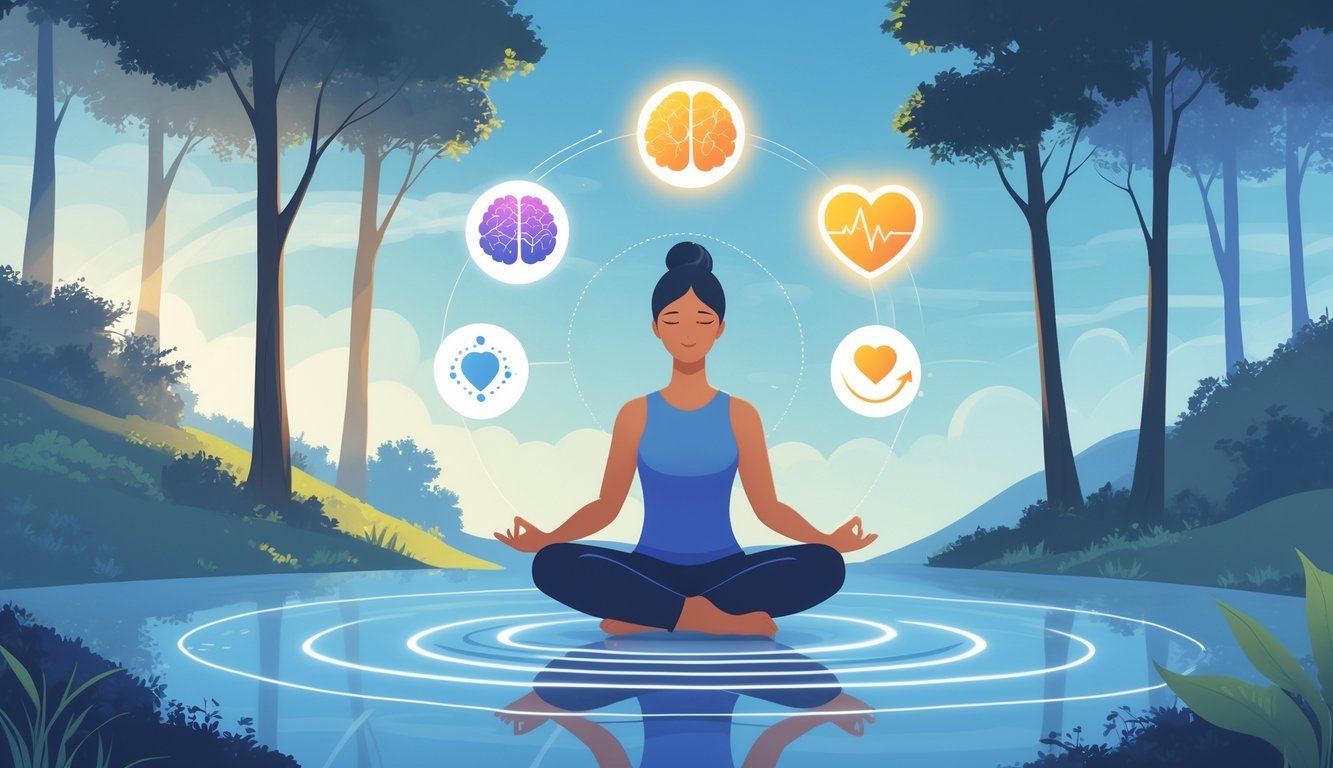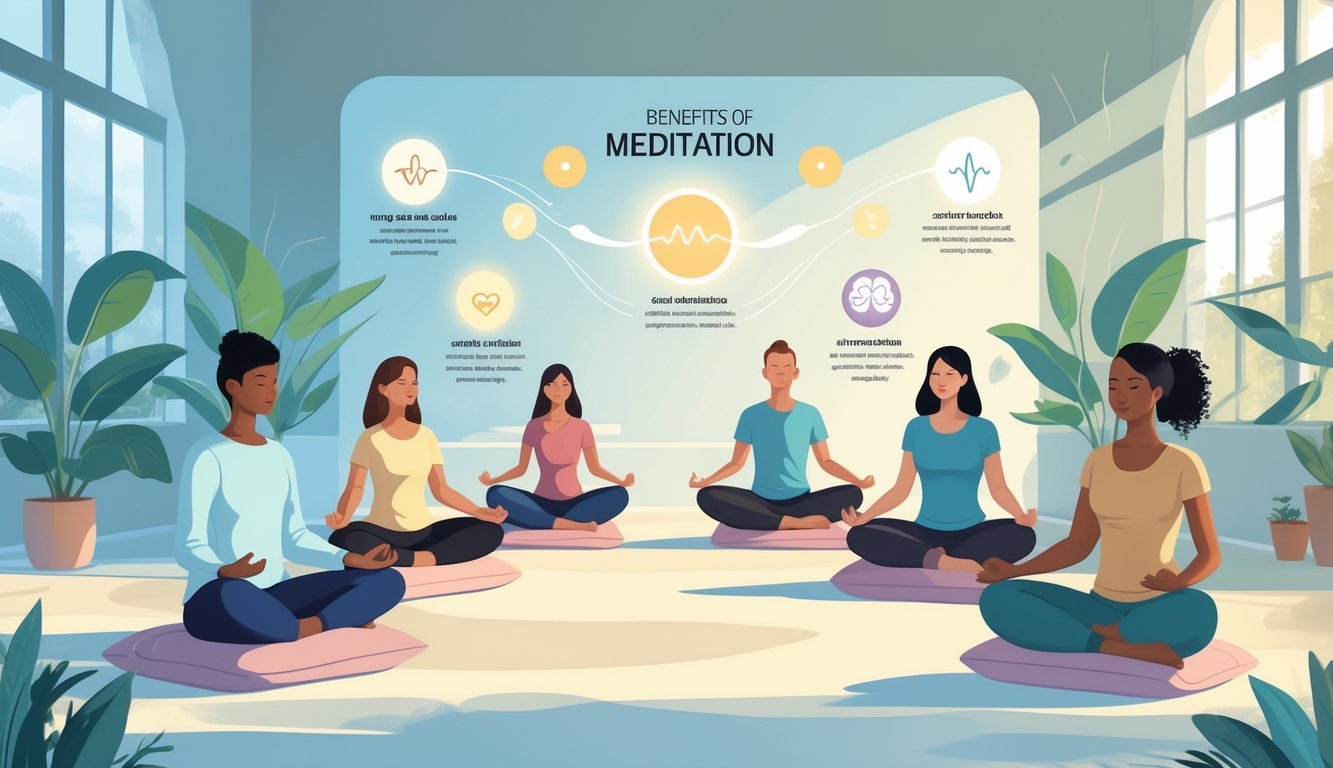PsychNewsDaily Publishers
100 Summit Drive
Burlington, MA, 01803
Telephone: (320) 349-2484
PsychNewsDaily Publishers
100 Summit Drive
Burlington, MA, 01803
Telephone: (320) 349-2484
Meditation enhances mental clarity, reduces stress hormones, improves emotional health, boosts focus and memory, and promotes better sleep and physical well-being through consistent practice.

Meditation’s pretty simple, honestly, and it can bring big benefits for your health and mind. It helps lower stress, reduce anxiety, and improve your emotional well-being.
A lot of people say regular meditation makes it easier to focus and stay calm, even when life gets messy.
You don’t need fancy gear or tons of free time to start. Just a few minutes each day can help you sleep better, lower your blood pressure, and even manage physical pain.
As you practice mindfulness through meditation, you’ll probably notice positive changes in how you feel and think.
If you’ve ever wondered how meditation actually works or what you might get out of it, you’re in the right place. Let’s take a look at the science and some of the real effects you can expect.
You’ll also pick up practical ways meditation can help your mind and body every day.

Scientists have spent years exploring how meditation changes your brain and affects your mental health. They use tools like fMRI and EEG to track shifts in brain activity and structure.
Researchers have tested lots of meditation programs and techniques to see which ones help most with stress, depression, and focus.
Meditation actually changes your brain’s physical structure. Brain scans like fMRI show that regular meditation thickens areas that handle attention and emotional control.
For instance, the prefrontal cortex, which helps you make decisions and stay focused, gets stronger with meditation. People who meditate regularly also show less activity in the amygdala, the part of your brain that deals with fear and stress.
These shifts mean your brain can work more calmly and clearly. Meditation also strengthens the connections between brain regions that control self-awareness and discipline.
Researchers have found that meditation reduces symptoms of depression and anxiety. Clinical psychology studies show people who practice mindfulness meditation report less stress.
Brain imaging often reveals more balanced brain activity after meditation sessions.
Some studies have focused on meditation’s impact on PTSD and found it can ease symptoms. Meditation also helps with chronic pain by changing how your brain processes discomfort.
It improves your ability to focus and be present. You get better at noticing your thoughts and emotions, which can lead to better mental health overall.
Researchers have studied several meditation methods and found them effective. Mindfulness-Based Stress Reduction (MBSR) is super popular—it blends mindfulness meditation with gentle yoga and has proven to reduce stress and improve well-being.
Other techniques include focused attention meditation, where you zero in on something like your breath, and loving-kindness meditation, which nudges you to feel more positive toward yourself and others.
Many studies use these programs to measure how meditation changes brain activity using EEG and fMRI scans.
Pick a technique that feels right for you—it’ll make sticking to meditation much easier.

Meditation can calm your mind and relax your body in a bunch of ways. It helps you handle stress, focus better, and supports your emotional health.
It also helps your physical health, like improving sleep and heart function.
When you meditate, you can lower your body’s cortisol—yep, that’s the stress hormone. This makes chronic stress and anxiety feel lighter.
Practicing mindfulness meditation slows your breathing and brings a deep sense of relaxation.
That relaxation helps your brain handle tough situations more smoothly. It can also ease depression symptoms by helping you notice your thoughts without getting overwhelmed.
Even a short daily practice can make stress feel less crushing and boost your mood.
Meditation trains your brain to stay present. This builds your attention span and makes it easier to ignore distractions.
Over time, you’ll find it easier to learn and remember things.
People who meditate regularly often notice sharper thinking. It helps you process information and recall memories more easily.
This mental clarity comes in handy at school, work, or just managing daily stuff.
Meditation supports your emotional health by helping you understand and control your feelings. You might find yourself becoming more self-aware and compassionate toward yourself and others.
That can bring out more kindness and gratitude in your life.
Meditation works as a tool for regulating emotions, so you don’t react so strongly to negative situations. By calming anxiety and depression, it boosts your overall mental well-being.
Lots of people say it’s easier to deal with tough emotions when they stick with meditation.
Meditation can help you sleep better by easing insomnia and quieting your mind before bed. Better sleep gives your body time to heal and keeps your immune system strong.
It’s also good for your heart, lowering blood pressure and supporting healthy heart function.
Meditation may even reduce chronic pain by changing how your brain perceives discomfort. This can make long-term pain less overwhelming.
These physical benefits help you feel more balanced and well every day.
| Benefit Area | Key Effects |
|---|---|
| Stress Reduction | Lowers cortisol, reduces anxiety & depression |
| Focus & Memory | Increases attention span and cognitive skills |
| Emotional Health | Boosts self-awareness, compassion, mood |
| Physical Health | Enhances sleep, heart function, pain relief |

Meditation can boost your memory, focus, and emotional control. It also helps reduce stress and can make it easier to get better sleep.
If you stick with it, meditation supports your overall health and even benefits things like your skin and school life.
Meditation can help you recall information more easily and improve your focus. It sharpens your thinking and deepens your emotional understanding.
These shifts make it easier to stay calm and think clearly, even when life throws curveballs.
Absolutely. Meditation lowers stress and helps you keep your emotions in balance.
By calming your mind, it can reduce anxiety and improve your sleep, which is pretty important for mental health.
Daily meditation supports both your body and mind. It lowers stress hormones and helps you become more mindful and compassionate.
That can make your day-to-day life feel more peaceful.
Meditation helps students focus and remember things better. It also lowers anxiety around exams and deadlines.
This makes learning easier and helps schoolwork feel less overwhelming.
Meditation reduces stress, which is tied to skin issues like acne. Less stress helps your body heal, so your skin can look and feel healthier.
You might start to feel more empathy for people around you. It’s not uncommon to find yourself handling emotions with a bit more ease.
Meditation often brings a steady, almost surprising sense of calm, even when life gets hectic. Some folks even say their creativity gets a boost, or their thoughts feel a bit sharper.
Honestly, who wouldn’t want a little more clarity in their day?